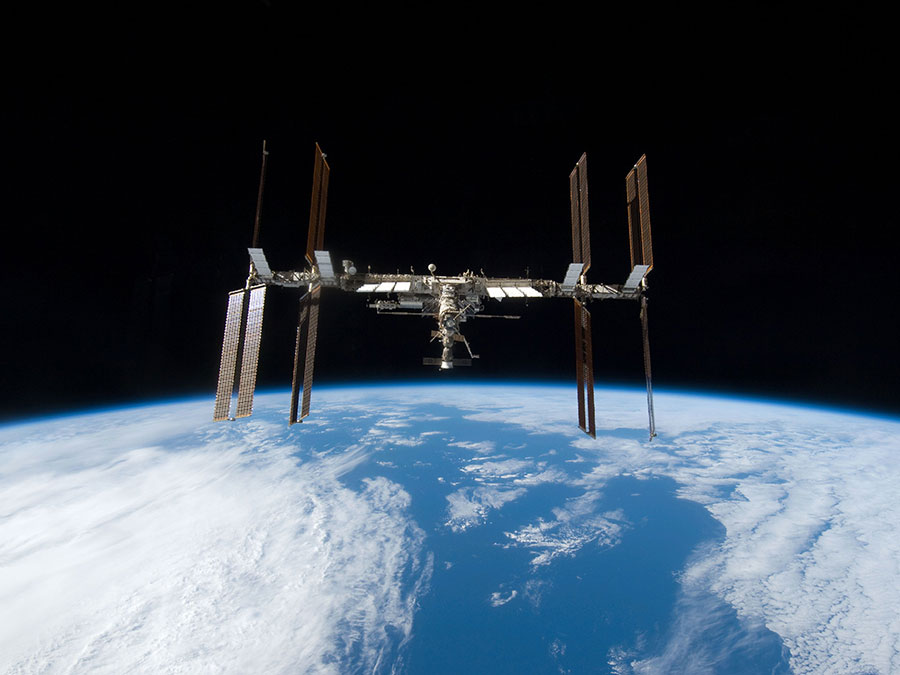Tissue Chips in Space
NCATS has partnered with the International Space Station U.S. National Laboratory (ISS National Lab), formerly known as the Center for the Advancement of Science in Space (CASIS), to collaborate on refining tissue chip technology for biomedical research use on the space station.
Translational research at the ISS National Lab provides unprecedented opportunities to study the effects of a microgravity environment on the human body. For example, it is now widely known that symptoms of accelerated aging occur after prolonged exposure to microgravity (diminished or close to zero gravity compared with Earth). Health concerns that resemble aging — such as muscle deterioration, osteoporosis (bone loss), reduced cardiopulmonary function and immune deficiency — when in space have been documented, and it also has been observed that these conditions are reversible when astronauts return to Earth. Tissue chip applications at the ISS National Lab will enable studies of organs at the cell and tissue levels under reduced gravity, will contribute to our understanding of the process of aging and could reveal molecular targets that can slow that process.
Overview
In October 2016, CASIS and NCATS, through the NCATS Tissue Chip for Drug Screening program, collaborated to leverage recent tissue engineering and microfabrication advances to create tissue- and organ-on-chip platforms that mimic human physiology in the extreme environment of space. The goal of the Tissue Chips in Space initiative is to create tissue- and organ-on-chip platforms that can be sent to the ISS National Lab so that scientists can better understand the role of microgravity on human health and diseases and translate those findings to improve human health on Earth. Through NCATS’ collaboration with space implementation partners, NCATS seeks to rapidly evolve tissue chip technology through miniaturization and automation of the chips when they are deployed to ISS, resulting in a much smaller footprint and essentially a turnkey technology for ease of use here on Earth.
In June 2017, NCATS issued five initial two-year awards, for up to a total of about $6 million, in response to a funding opportunity to use tissue chip technology for translational research on board the ISS National Lab for the benefit of human health on Earth. CASIS is providing approximately $8 million in in-kind support.
In November 2017, NCATS and the National Institute of Biomedical Imaging and Bioengineering (NIBIB) issued a funding opportunity for tissue- and organ-on-chip research at the ISS National Lab to study human physiology and disease. Data from this research will help scientists develop and advance novel technologies to improve human health.
In October 2018, NCATS, NIBIB and the ISS National Lab announced four new Tissue Chips in Space awards for about $4.98 million to researchers to use tissue chip technology to better understand mechanisms of disease and the effectiveness of potential treatments in the extreme environment of space. Scientists will use this information to assess biomarkers, bioavailability, efficacy and toxicity of therapeutic agents prior to clinical trials.
During the first phase of the Tissue Chips in Space initiative, researchers developed and tested tissue chips on the ISS National Lab in a microgravity environment. In this second phase, the researchers will further demonstrate the functional use of the tissue chip models for more defined experiments on the ISS National Lab.
Tissue chip developers will team with ISS National Lab space implementers to meet the NASA flight qualification requirements and complete payload development and pre- and post-flight analyses. NCATS anticipates that applications will need to demonstrate a multidisciplinary approach that brings together experts in areas such as bioengineering, fluid control, novel materials design, genomics, computational biology, disease biology, pathology, electrophysiology, pharmacology, biostatistics and clinical science. For details, visit the CASIS Tissue Chip blogspot.
In December 2018, NCATS announced the launch of the first NIH-supported tissue chips into space for research.
In May 2019, four additional NCATS-funded tissue chip projects took their first mission to the International Space Station. The tissue chips mimic lung and bone marrow, bone and cartilage, the kidney and the blood-brain barrier that protects our brain from infections and toxins in the blood.
In March 2020, a third launch took NCATS-funded tissue chip projects looking at intestinal and heart tissues on their first flight to the International Space Station.
In December 2020, three tissue chip projects traveled to the ISS National Lab, including the first Tissue Chips in Space project to take its second trip. That project, which is focused on preventing osteoarthritis after joint injuries, first traveled to space on May 4, 2019. The flight also carried projects studying the causes of muscle wasting and whether heart tissue damage can be reversed.
Two projects that first traveled to the International Space Station in May 2019 made their second trips in 2021. Tissue chips modeling the kidney took their second flight on June 3, 2021, and tissue chips modeling the blood-brain barrier launched on December 21, 2021.
In July 2022, two tissue chip projects took their second flight to the ISS National Lab. One project is studying the causes of muscle wasting and whether changes due to muscle wasting can be prevented. The second project is investigating immune aging and healing outcomes.
NIH-NASA Biomedical Research Activities
Through an ongoing collaboration, NIH and NASA are exploring how biomedical research can address the challenges of deep space exploration and benefit human health in space and on Earth.



